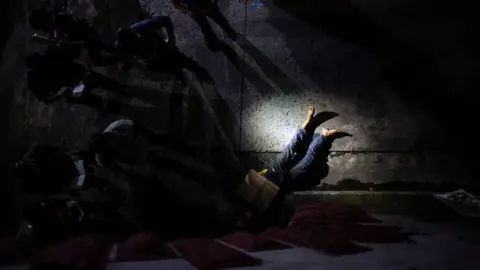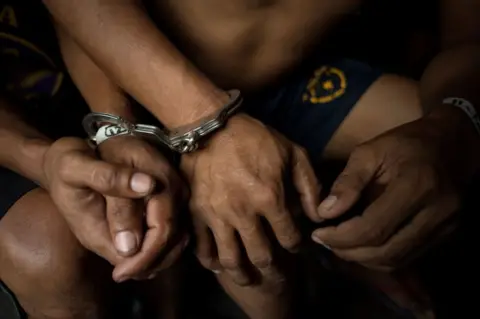Philippine drug war sees 'bloodiest night' of deaths
 Getty Images
Getty ImagesPhilippine police have killed 32 people in drug raids, thought to be the highest death toll in a single day in the country's war on drugs.
The raids took place over 24 hours on Tuesday in Bulacan province, north of the capital Manila.
Police said that those killed were suspected drug offenders who were armed and resisted officers.
Thousands have been killed since President Rodrigo Duterte launched his controversial war on drugs in 2016.
The campaign, aimed at wiping out the drug trade, has attracted intense international criticism over the number of deaths. Mr Duterte has in the past sanctioned extrajudicial killings.
Tuesday's operation, which lasted from midnight to midnight, comprised dozens of raids carried out across Bulacan according to local reports. More than 100 people were arrested and officers seized illegal drugs and arms in the raids.
 AFP/Getty Images
AFP/Getty Images
'Drug war far from over' - Howard Johnson, BBC News, Manila
Despite falling away from the international headlines, the record number of killings is a reminder that President Duterte's war on drugs is far from over.
In a strongly worded public address last month he warned drug users that he would hound them to the "gates of hell."
I recently met a woman who told me her son was shot and killed by masked vigilantes during a late evening "buy-and-bust" raid. She insisted her son wasn't a dealer, and had his marijuana use declared to the authorities three months before the killing.
Despite stories of extra-judicial killings like this, many in the Philippines support the war on drugs.
Taxi drivers have told me that roadside bag snatching has subsided. Manila residents I've spoken to say the streets feel safer.

Rights groups have accused Philippine police of planning extrajudicial killings and in some cases profiting from them.
Police have maintained that the suspects are killed when they offer armed resistance to police, a claim that has been highly disputed.
Mr Duterte suspended the campaign in January promising to "clean up" the police, and re-organise the anti-drug units. The campaign resumed in March.
